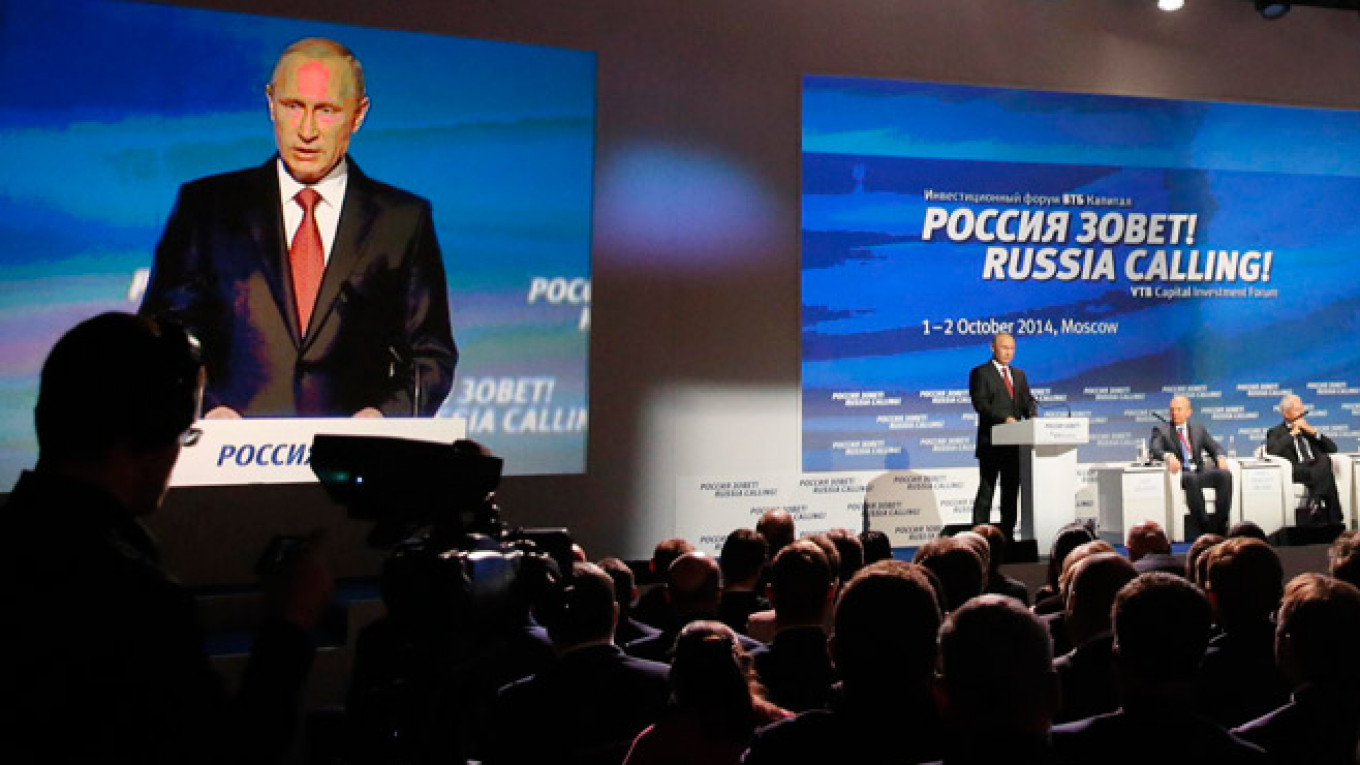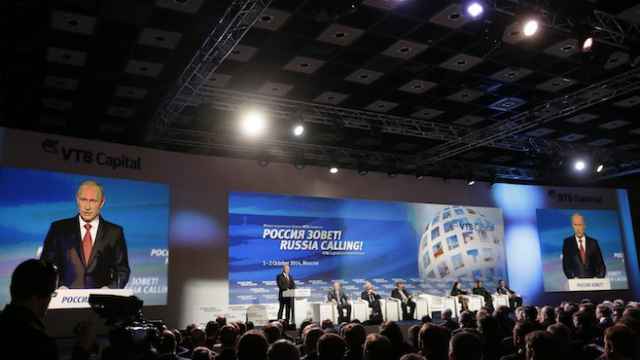The government will not stimulate Russia's faltering economy by increasing spending, but will support major companies and infrastructure development through injections of state capital, top officials said at an investment forum on Thursday.
Speaking at the event, President Vladimir Putin branded Western sanctions on Moscow over Ukraine "stupid," and said they would neither force Russia out of the global economy nor weaken its economic clout. He ruled out the return of capital controls.
"We truly want a country that is strong, flourishing, free and open to the world," he told the VTB Russia Calling conference.
Russia is in an economic bind. Growth is close to zero, inflation is expected to hit 8 percent by the year's end, and sanctions have limited Russia's access to international capital markets and much needed technology. Money is flooding out of the economy — capital flight is expected to reach $120 billion this year — and the value of the ruble is plummeting.
Putin, flanked by his finance and economic development minsters, strove to convince the forum that he can handle the situation.
Tighten Your Belt
What Russia needs, according to Finance Minister Anton Siluanov, is to limit overall state spending government spending and target resources in effective investment. Indeed, Siluanov's ministry plans to cut a trillion rubles ($25 billion) of government spending in the next three years.
Siluanov also promised not to raise taxes, a commitment echoed at the forum by Putin.
Money saved through fiscal belt-tightening will be injected into reserve funds for spending on infrastructure.
"We are now investing into developing the Moscow transportation hub, airports, seaports. We have begun big projects in the Far East," Siluanov said.
Economic Development Minister Alexei Ulyukayev said the government will, with the Central Bank, soon adopt a program to support investment projects valued at 1 billion to 20 billion rubles ($25-$250 million). Investors will be granted 10-year bank loans at the Central Bank's key rate of interest — 8 percent — plus 1 percent, far undercutting standard high-street offers.
To allow Russia's financial institutions to keep oiling the economy's wheels, Putin said major state banks hit by "unwarranted" sanctions will get government aid to boost their capital.
Give With One Hand, Take Away With the Other
Top government officials appear to have a united view on overall policy but are struggling to take concrete steps toward these goals, former Deputy Economic Development Minister Sergei Belyakov, who was sacked earlier this year for publicly criticizing the government, said on the sidelines of the forum.
"They all say the right things, but the market is not reacting to their remarks. It is responding to the situation around [oil-to-telecoms conglomerate] Sistema," Belyakov said.
Sistema's billionaire owner Vladimir Yevtushenkov was arrested last month on suspicion of money laundering during the purchase of a majority stake in oil firm Bashneft in 2009. The move has shaken business confidence: Most analysts see the arrest as a state asset grab and wonder whether Bashneft will be the only company to brush with forced nationalization.
At the forum Putin said he will not interfere in the Bashneft case and reaffirmed his commitment to privatization. Saying there would not only be "no total revision" of state asset sales, he promised new sales in the energy and defense sectors, something that has not been floated before.
Contact the author at a.panin@imedia.ru
A Message from The Moscow Times:
Dear readers,
We are facing unprecedented challenges. Russia's Prosecutor General's Office has designated The Moscow Times as an "undesirable" organization, criminalizing our work and putting our staff at risk of prosecution. This follows our earlier unjust labeling as a "foreign agent."
These actions are direct attempts to silence independent journalism in Russia. The authorities claim our work "discredits the decisions of the Russian leadership." We see things differently: we strive to provide accurate, unbiased reporting on Russia.
We, the journalists of The Moscow Times, refuse to be silenced. But to continue our work, we need your help.
Your support, no matter how small, makes a world of difference. If you can, please support us monthly starting from just $2. It's quick to set up, and every contribution makes a significant impact.
By supporting The Moscow Times, you're defending open, independent journalism in the face of repression. Thank you for standing with us.
Remind me later.





